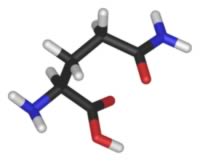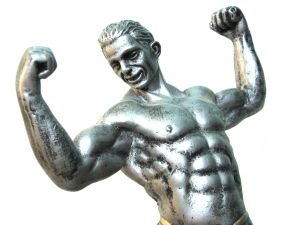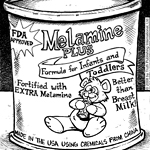The Essential Non-Essential Amino Acid for Athletes and Non-Athletes Alike
| Share on Facebook | Share on Twitter | Share on Google+ |
Key Points in "L-Glutamine for Bodybuilding"
- Most bodybuilders don't need to add glutamine to their stacks unless they are recovering from injuries or they tend to get infections after heavy exercise. Adding a magnesium supplement, however, helps the body use glutamine better.
- Weekend warriors and casual exercisers may find glutamine supplements more useful than well-trained athletes, since their muscles suffer injuries more easily.
- Glutamine is essential to gut integrity, especially during low-calorie dieting or when ending a fast.
- Glutamine plus branched-chain amino acids in a post-workout drink may help diabetics get more fat-burning from their workouts.

L-glutamine, or just glutamine, is the most abundant amino acid in the human bloodstream. It is also the most frequently supplemented amino acid, and the amino acid most abundant in food. Bodybuilders are well acquainted with the ergogenic, muscle-building properties of glutamine. But glutamine supplementation has value beyond just bulking up muscle.
Glutamine as an "Alkalizer"
At any given time, glutamine accounts for about a third of all the amino acids in the human bloodstream. Although it is technically an acid, the presence of glutamine is extremely important for preventing acid buildup in the blood.
Every molecule of glutamine holds two ammonia groups. One of the ammonia groups in glutamine comes from glutamate (also known as glutamic acid), the amino acid from which the body makes glutamine. The other ammonia group comes from ammonia in the bloodstream released as other amino acids are broken down.
The kidneys use glutamine to keep the pH of the bloodstream almost constant, not too high and not too low, but transforming glutamate into glutamine and back again. When there is not enough glutamine or glutamate, the kidneys can also use calcium from bone. That is the reason "acidifying" diets are associated with osteoporosis and increased risk of bone fractures.
The human body transforms glutamate into glutamine when it needs to acidify the blood by allowing ammonia into the bloodstream. This process requires an enzyme called glutamine synthetase. It also requires magnesium to act as a cellular battery to provide the energy for the conversion.
The body transforms glutamine back into glutamate when it needs to alkalize the blood by removing ammonia out of the bloodstream. This process requires a different enzyme called glutaminase. This enzyme transforms glutamine into glutamate in the kidneys so they can excrete ammonia in the form of urea. This action detoxifies the bloodstream by removing excess ammonia.
Instead of having to manage levels of 22 different amino acids, the kidneys in effect just have to manage these two amino acids to keep the blood at the right pH with tolerable levels of ammonia released as the body uses amino acids to make proteins. Glutamine also requires the least energy of all the amino acids that could be used for this purpose. Rebuilding injured muscles or bulking out new muscle, however, changes the body's use of glutamine.
Glutamine in Muscle Repair
Injured muscles need large amounts of glutamine to repair them. Growing muscles need glutamine to build new fibers to give the muscle greater strength. But glutamine supplements are only likely to be needed by (1) people who exercise only occasionally and (2) people who exercise so often they don't give their muscles time to recover.
When there is not enough glutamine in the bloodstream to repair injured muscles, the body shifts glutamine from the production of white blood cells (the cells that fight infection) to injured muscle. This is the reason athletes involved in intense competition or intense training tend to get colds and flu. But it isn't just serious athletes who overtrain.
"Weekend warriors" can exceed their limits much more easily than athletes following a rigorous workout routine. People who exercise infrequently can experience much more severe muscle injury than athletes who overtrain. Both groups benefit from glutamine supplementation or glutamine in the stack, casual athletes probably moreso than serious athletes.
Glutamine and Digestion
Getting enough glutamine is also essential to good digestion.
The cells lining the intestine use glutamine not just for building but also for powerful. The lining of the gut transforms glutamine into glutamate and then into alpha-ketoglutarate as fuel for the cell. This process depends on having enough glutamine available from food to be used as energy.
When there is not enough glutamine in the food supply to fuel the cells in the lining of the gut, they don't build the storage pockets known as villi quite as high. This means the intestine cannot absorb as many nutrients from digested food and it can't fight infections as well.
The cells in the lining of the intestine have a very short lifespan. It may be as little as six days before they are sloughed off and replaced, new cells forming the bottom of the villi and being pushed up to the top of the villi in less than a week. If your diet does not provide the glutamine your intestine needs for constant building and rebuilding, in just a week you can lose 50% of your ability to absorb food. It becomes very hard to break a fast-or an extreme low-calorie diet.
The cells in the lining of the intestine also can't use glutamine as efficiently if you are under stress. The stress hormone adrenalin interferes with an enzyme that cells that use glutamine as fuel need to convert glutamine to glutamate. If you are in pain, or if you are worried, or if you are in an unusual environment, your gut needs more glutamine to maintain itself than if you are stress-free.
You have to restore glutamine first before your body can use the other components of your diet if you have been deprived of food for a week or more. And if you are going to pursue a severely calorie-restricted diet, you need a constant supply of glutamine so you won't experience "refeeding syndrome," in effect, your body's rejection of food, when eventually you start eating normally again.
But glutamine is primarily important to recovery from injury and severe protein deprivation. If you are on a mountain bike race across Mongolia, you may need supplemental glutamine. If you have been stabbed in the gut and you were not able to eat for a week, you definitely need supplemental glutamine. But what about the day to day needs of bodybuilders and weekend warriors?
Does Glutamine Work? Are There Benefits of Glutamine for Bodybuilders?
Most bodybuilders don't need glutamine in their stacks. Here are the reasons why:
- Exercise is not nearly as stressful to the body as tissue injury. Compared to a one-hour weightlifting workout, minor surgery requires 14 times as much glutamine, major surgery requires 25 times as much glutamine, and surgery complicated by infection requires 33 times as much glutamine. The body's metabolic demand for glutamine as fuel is 7 times greater after a burn than after a workout.
- Anywhere from 3% to 10% of the weight of dairy products is glutamine. About 15% of meat, fish, and eggs is glutamine. If you are eating 200 g of protein a day, you are already getting about 20 grams of glutamine. An elite weight lifter might actually need 80 to 100 g of glutamine a day, but if you are eating 2000 calories a day as protein, you likely are getting more than enough glutamine.
- The cells lining your intestines feed on glutamine. When you take glutamine supplements, they get their fill first.
- The research that supported that use of glutamine in post-workout energy drinks turned out to suffer methodological mistakes. Researchers tested glutamine for amino acid replacement after "supramaximal" exercise, comparing it with an energy drink that just provided glucose. A small amount of glutamine was found to be as beneficial as a large amount of glucose for restoring glycogen supplies. (Glycogen is the storage form of glucose in the liver and in muscle, made in these tissues by combining glucose and water.) A better interpretation of the results might have been that a large amount of glucose didn't do any more good than a small amount of glutamine, because the breakdown of proteins during heavy exercise creates urea and glucose, which replenishes energy supplies. Heavy exercise breaks down muscle tissue into sugar. Drinking more sugar has modest effects, like taking glutamine.

And no study has found that muscle volume increases if athletes take glutamine after workouts. However, there are some situations in which including glutamine in the stack is a good idea.

- Marathons, biathlons, triathlons, cross-country ski events, cross-country bike races, and high-altitude sports cause extreme muscle breakdown. People who climb Mt. Everest, for example, suffer muscle weakness for months or years after the event. If you are involved in high-intensity extreme sports, then glutamine supplementation is probably a good idea.
- Extremely obese persons who are both exercising and following a diet may experience the same changes in muscle after moderate exercise (even walking around the block in some cases) as fit persons experience in extreme sports. Glutamine may be helpful as an adjunct to weight-loss dieting.
- Steroid users coming off treatment may benefit from glutamine. After testosterone injections are stopped, testosterone levels fall but stress hormone levels stay elevated. Glutamine helps muscles deal with stress hormones.
- Glutamine helps protect white blood cells that otherwise might be broken down after heavy exercise to provide glutamine to muscle tissue.
- And, as I explain in the last of the Frequently Asked Questions, glutamine and branched-chain amino acids make a good post-workout mix for diabetics.
What is the right glutamine dosage for bodybuilders? When glutamine is appropriate, 10 to 15 g a day is about the maximum for benefits of glutamine for bodybuilders. More just becomes sugar and urea (and tends to cause diarrhea), while less does not have a tissue-protective effect.
Frequently Asked Questions
Q. What about glutamine and creatine together?
A. Creatine doesn't work without water. If you are dehydrated, creatine can't bulk out the muscle cell. Glutamine helps cells avoid dehydration. But so does drinking water.
Q. Are there any studies that show benefits from taking glutamine?
A. One study found that athletes who eat "mixed meals" of fat and carbohydrate burn more calories if they take glutamine. Carb burning increased during the first 2 or 3 hours after eating the meal and fat burning increased during the second 2 or 3 hours, so that overall calorie burning was 49% greater.
If you are dieting for weight loss, and especially if you are diabetic or prediabetic, however, you probably should not be mixing carb and fat at mealtime. Excess carb and excess fat compete for insulin, and excess fat always wins. If you are prediabetic and you have high insulin levels to begin with, that means that your body will take the fat and store it before the glutamine increases fat burning. And if you are diabetic, you really need to be limiting your carbs anyway, and glutamine can't increase carb burning if you don't have the insulin to deliver the carbs to the cells where they will be burned.
Q. What about glutamine with branched-chained amino acids (isoleucine, leucine, and/or valine)?
A. There is an energy drink called SURGE that combines glutamine and branched-chain amino acids to increase the muscle's response to insulin. For a couple of hours after exercise to muscle exhaustion, the muscles are about 50 times more sensitive to insulin, which helps them absorb more glucose (to rebuild glycogen) and amino acids (to rebuild muscle fibers). Glutamine is added to the mix so muscles absorb more amino acids.
This effect only occurs (1) after strenuous exercise and (2) for a couple of hours after exercise. It makes sense to use an energy drink that combines glutamine with branched-chain amino acids post-workout, but not at any other time. If you are diabetic or prediabetic, however, this can help your workouts do a lot more for your blood sugar control-possibly so much that you experience hypoglycemia. If you are diabetic, be sure to test your blood sugars after working out if you take this kind of post-workout drink.
Glutamine and branched chain amino acids help diabetics build muscle with less carb, and they cost enough that you may want to try to cut your food bill elsewhere. For diabetics, this is usually a good thing. Just remember that it will only help your diabetes if you use it after exercise.
Selected References:
Castell LM, Poortmans JR, Newsholme EA. Does glutamine have a role in reducing infections in athletes? Eur J Appl Physiol Occup Physiol 1996;73(5):488-90
Castell LM, Newsholme EA. The effects of oral glutamine supplementation on athletes after prolonged, exhaustive exercise. Nutrition 1997 Jul-Aug;13(7-8):738-42
Castell LM. Can glutamine modify the apparent immunodepression observed after prolonged, exhaustive exercise? Nutrition 2002 May;18(5):371-5
Hankard RG, Haymond MW, Darmaun D. Effect of glutamine on leucine metabolism in humans. Am J Physiol 1996 Oct;271(4 Pt 1):E748-54.
Hickson RC, Czerwinski SM, Wegrzyn LE. Glutamine prevents downregulation of myosin heavy chain synthesis and muscle atrophy from glucocorticoids. Am J Physiol 1995 Apr;268(4 Pt 1):E730-4.
Lacey JM, Wilmore DW. Is glutamine a conditionally essential amino acid? Nutr Rev 1990 Aug;48(8):297-309.
Varnier M, Leese GP, Thompson J, Rennie MJ. Stimulatory effect of glutamine on glycogen accumulation in human skeletal muscle. Am J Physiol 1995 Aug;269(2 Pt 1):E309-15.
Zachwieja JJ, Witt TL, Yarasheski KE. Intravenous glutamine does not stimulate mixed muscle protein synthesis in healthy young men and women. Metabolism 2000 Dec;49(12):1555-60.
Zorzano A, Fandos C, Palacin M. Role of plasma membrane transporters in muscle metabolism. Biochem J 2000 Aug 1;349 Pt 3:667-88
-
Skin CareMen Skin Care
-
Free ResourcesFree eBooks
-
Let food be thy medicine, and let thy medicine be food.Hippocrates
-
Featured Health Supplement
 ...a broad spectrum of around 80 of the nutrients that your body needs…including vitamins, minerals, trace elements, antioxidants,
amino acids, neuronutrients, bioflavonoids, carotenoids, herbal extracts, enzymes and other complementary co-factor ingredients.
...a broad spectrum of around 80 of the nutrients that your body needs…including vitamins, minerals, trace elements, antioxidants,
amino acids, neuronutrients, bioflavonoids, carotenoids, herbal extracts, enzymes and other complementary co-factor ingredients.
-



















